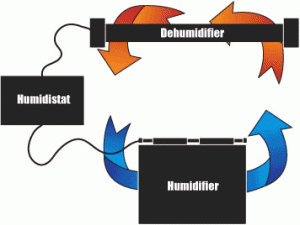Sometimes, we are not able have the piano in an ideal place within a room. At times, the heating and air conditioning must be run excessively in order to keep us humans happy. Or, in some situations, like churches, running the heating and air conditioning on the weekends only is unavoidable. All of these scenarios make it tough for your piano to stay in tune. However, each of these scenarios can be remedied with a piano climate control system.
What is a piano Climate Control System?

Block diagram of a PianoLifeSaver System
Courtesy Dampp-Chaser Corporation
Climate control systems are designed to stabilize the humidity within the soundboard of the piano. They do this by using an electronically controlled humidifier and dehumidifier. These two components are continuously monitored and controlled by a third device called a humidistat. Together, the system will maintain an ideal climate for your piano while requiring only minimal interaction from the owner. By providing a consistent humidity level within the piano, you can expect the piano to sound more “in tune” between regular tunings. In addition, the piano humidifier-dehumidifier will prevent expensive damage to wood, keys, strings and the soundboard.
The most popular climate control system on the market is the Piano Life Saver System from Dampp-Chaser Corporation. This cleverly designed system works amazingly well to keep your piano’s humidity level constant year round. According to Dampp-Chaser, benefits of the Piano Life Saver System include:
- Permits the tuning to hold better between regular tunings
- Minimizes the expansion and contraction of action parts in upright pianos which provides improved touch and predictable keyboard control
- Prevents rust on the strings and metal parts
- Minimizes felt deterioration, reducing the harsh tones that come from flattened hammer felt in low humidity or the muffled, tones from swollen hammer felt in high humidity
- Minimizes glue failure throughout the piano
- Protects your investment year after year
Piano climate control systems have been in use for several decades and the benefits of using one are well documented. Though not needed in every situation, I highly recommend their use in environments where humidity tends to vary drastically or for any owner who wants to maintain the value and longevity of their instrument at the highest possible level.
How do I know if I need a climate control system?
Determining whether your piano should have a climate control system installed is not always an exact science. But, there are often tell-tale clues. Your piano will likely benefit from a climate control system if:
- Your piano goes far out of tune in between regular tunings
- Your piano needs to be tuned more often than normal (typically 1 to 2 times a year with normal use in Southern California)
- Your piano experiences problems with sticking or warped keys
- You notice rust on the tuning pins or strings
- You notice cracks in the soundboard, or bridge
- Your piano technician mentions loose tuning pins
Because some of the symptoms listed above can be caused by problems other than humidity related issues, I recommend discussing it with your piano technician. It is important to know that not all piano technicians are familiar with climate control issues. Dampp-Chaser Corporation offers an excellent training and certification program for piano technicians. To activate the 5-Year Warranty for the system, it must be installed in the piano by a professional piano technician. Dampp-Chaser provides a searchable list of certified installers on their website.